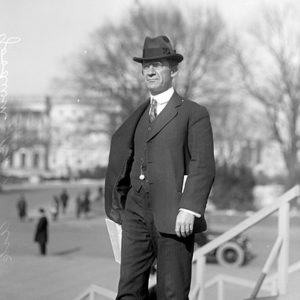calsfoundation@cals.org
William Shields Goodwin (1866–1937)
William Shields Goodwin was a Democratic member of the U.S. House of Representatives. He represented the Seventh District of Arkansas in the Sixty-Second through the Sixty-Sixth U.S. Congresses, serving from 1911 to 1921.
William Shields Goodwin was born on May 2, 1866, in Warren (Bradley County) to Thomas Morrison Goodwin and Esther Shields Goodwin. He was educated in the local public schools before attending Farmers’ Academy in Duluth, Georgia; Cooledge’s Preparatory School; and Moore’s Business College in Atlanta. He also studied at both the University of Arkansas (UA) in Fayetteville (Washington County) and the University of Mississippi. He also studied the law and was admitted to the Arkansas bar in 1894, after which he opened a practice in Warren. He soon got involved in politics and won election to the Arkansas House of Representatives in 1895.
Goodwin married Margaret Susan Meek on December 22, 1897, and they had three children.
In 1900, Goodwin served as a Democratic presidential elector. He then won election to the state Senate, a body in which he served from 1905 until 1909. He also served as a member of UA’s board of trustees, a post he held from 1907 until 1911.
In 1908, he mounted a challenge to incumbent U.S. Representative Robert Minor Wallace for the party nomination, but it was unsuccessful. However, with two years to organize, in 1910 Goodwin was able to wrest the nomination away from Wallace, and in November, as the Democrats won their first majority in the U.S. House of Representatives since the election of 1892, Goodwin won the first of his five terms. He would eventually come to represent the Seventh District for a decade from March 1911 until March 1921. That period included World War I, and Goodwin’s congressional responsibilities included service on the Committee on Foreign Affairs. He was one of a select group of congressmen who went to Europe around Christmas time in 1917 in an effort both to assess the war effort and start the process of facilitating better relations between the United States and foreign powers following the war. (While Goodwin and his colleagues were impressed with the efforts of the British and French soldiers they observed, they proved unduly pessimistic in predicting that it would be a long war.)
Goodwin also served on the Committee on Expenditures in the State Department, as well as the Committee on Elections, the Claims Committee, and the Merchant Marine and Fisheries Committee. Despite a string of strong electoral showings, including a victory running unopposed in 1918, Goodwin’s effort to win a sixth term in 1920 was unsuccessful, as he was denied re-nomination by the local party.
Goodwin returned to Warren, returning to the practice of law. On August 7, 1937, Goodwin addressed a mass meeting at the Bradley County courthouse opposing the controversial replacement of Senator Joe T. Robinson. Battling a heart condition, Goodwin was forced to allow a supporter to complete his speech. The former congressman suffered a heart attack later that day and died on August 9, 1937. Goodwin is buried in Oakland Cemetery in Warren.
For additional information:
“Duty to Democracy Drives Goodwin to His Death.” Warren: The Eagle Democrat, August 12, 1937, pp. 1, 9.
“Goodwin Funeral Impressive In Tribute.” Warren: The Eagle Democrat, August 12, 1937, p. 1.
Herndon, Dallas T. Centennial History of Arkansas. vol. 1. Chicago: S. J. Clarke Publishing, 1922.
“William Shields Goodwin.” Biographical Directory of the United States Congress. http://bioguide.congress.gov/scripts/biodisplay.pl?index=G000304 (accessed September 16, 2021).
William H. Pruden III
Ravenscroft School
 Early Twentieth Century, 1901 through 1940
Early Twentieth Century, 1901 through 1940 William Goodwin
William Goodwin 




Comments
No comments on this entry yet.